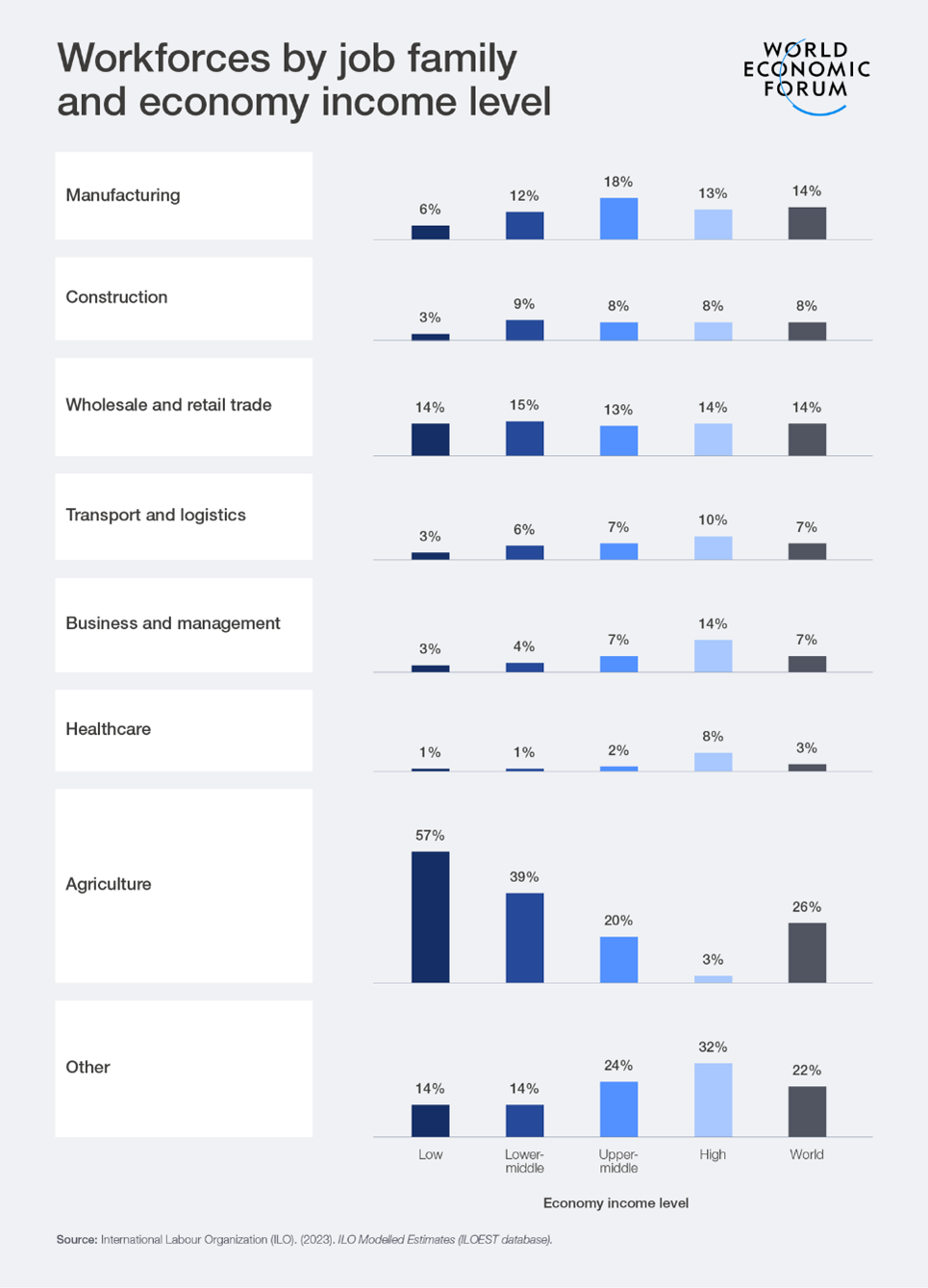- Four technologies are poised to transform labour markets with the greatest impact expected in seven job families that employ almost 80% of workers worldwide.
- Realizing the vast opportunities while minimizing risks will require targeted investment, improved technology access in developing markets and inclusive platform design.
- Applications already making an impact include drone-enabled agricultural harvesting, AI-powered logistics support for small businesses and micro-energy systems.
- Read the report here . Follow the Annual Meetings of the Global Future Councils and Cybersecurity 2025 here and on social media using #AMGFCC25
Geneva, Switzerland, 14 October 2025 - Four emerging technologies - AI, robotics, advanced energy systems and sensor networks - are poised to reshape global labour markets, creating new opportunities to boost productivity and transform jobs in agriculture, manufacturing, healthcare and other critical sectors, according to a new World Economic Forum report. Yet, unlocking this productivity potential and managing risks will require concerted actions such as mobilizing investment capital, accelerating global technology diffusion and ensuring inclusive access.
The report, Jobs of Tomorrow: Technology and the Future of the World's Largest Workforces , developed by the Forum's Global Future Council on Jobs and Frontier Technology , examines seven job families where technological transformation will likely have the greatest global impact. Together they represent almost 80% of the global workforce: agriculture, manufacturing, construction, wholesale and retail trade, transport and logistics, business and management, and healthcare.
"The path of technology development will be determined by decisions made now and in the coming years" said Till Leopold, Head of Work, Wages, and Job Creation, World Economic Forum. "Understanding which technologies will be most transformative and how they will transform seven job families that make up almost 80% of the world's workers is crucial to anticipating their impact and driving towards positive outcomes."
While the global debate has focused on desk-based office jobs, the report highlights how emerging technologies are also driving real-world change beyond such occupations. Drone technology is already enabling efficient urban deliveries in the United Arab Emirates and for transporting critical supplies - such as medical equipment - to rural Ghana. Rooftop renewable energy systems in several African countries are stabilizing frontline workers' hours, preventing them from being sent home during power cuts, while creating demand for energy system professionals.
The report also showcases how semi-automated construction equipment is reducing physical strain on workers and improving safety. Additionally, robotics combined with AI data processing could redesign the patient journey and the workforce in the healthcare sector.
With transformative technologies presenting both opportunities and risks, tailored industry and context-specific actions will be crucial, as per the report. In agriculture and healthcare, the priority is enhancing technology diffusion and access, particularly in developing markets. Manufacturing strategies must vary by country, depending on local industrial ecosystems. The closely linked wholesale, retail, transport and logistics sectors would benefit most from well-functioning technology platform markets that improve routing and inventory efficiency without concentrating market power.
"These technologies hold immense promise to amplify human potential. The Global Future Council on Jobs and Frontier Technologies unites diverse expertise to reimagine meaningful work advancing upskilling and reskilling while anticipating and addressing potential challenges along the way," said Neeti Shukla, Co-Chair, Global Future Council on Jobs and Frontier Technology and Co-Founder and Chief Social Impact Officer, Automation Anywhere, Inc.
The research calls for tailored collaborative action from employers, governments and technology developers to maximize the benefits of the transformations ahead. Key steps needed today to build a more productive and inclusive global workforce tomorrow include: enabling greater tech investment and diffusion, facilitating efficient and supportive market structures, understanding employers' strategic workforce goals, and understanding the potential of a technology-enabled workforce.
To this end, the Global Future Council on Jobs and Frontier Technology will focus the remainder of its 2025-2026 term on assessing how to ensure technological development enables higher-productivity jobs inclusively and identifying specific actions for stakeholders.
"The paper provides clarity on where the biggest transformation opportunities exist" said Sam Grayling, Council Manager and Insights Lead, Work, Wages, and Job Creation, World Economic Forum. "By bringing together such diverse perspectives, the Global Future Council network can draw on wide expertise to create a pathway for technology development to enhance livelihoods worldwide".

Methodology
The Global Future Council on Jobs and Frontier Technology defines workforce-transforming technologies as advances that can rapidly reshape the workforce, boosting productivity, creating new roles and addressing societal challenges, while posing systemic risks that require action. The council used the Future of Jobs Report 2025 to review the expectations of employers worldwide, drew on the expertise of its members and assessed workforce implications in industries and job families before identifying the four frontier technologies explored in the report.
About the Annual Meetings of the Global Future Councils and Cybersecurity 2025
To address the interconnected challenges of the Intelligent Age and advance cybersecurity and resilience across sectors, the World Economic Forum will convene over 500 experts from business, government, civil society and academia, alongside 150 of the world's foremost cybersecurity leaders, for a special joint meeting from 14 to16 October, in Dubai, United Arab Emirates. Insights from the meetings will inform the Forum's upcoming work, including the Annual Meeting 2026 in Davos.






